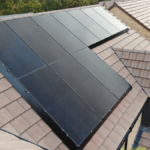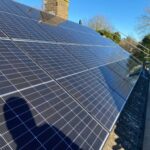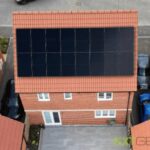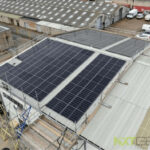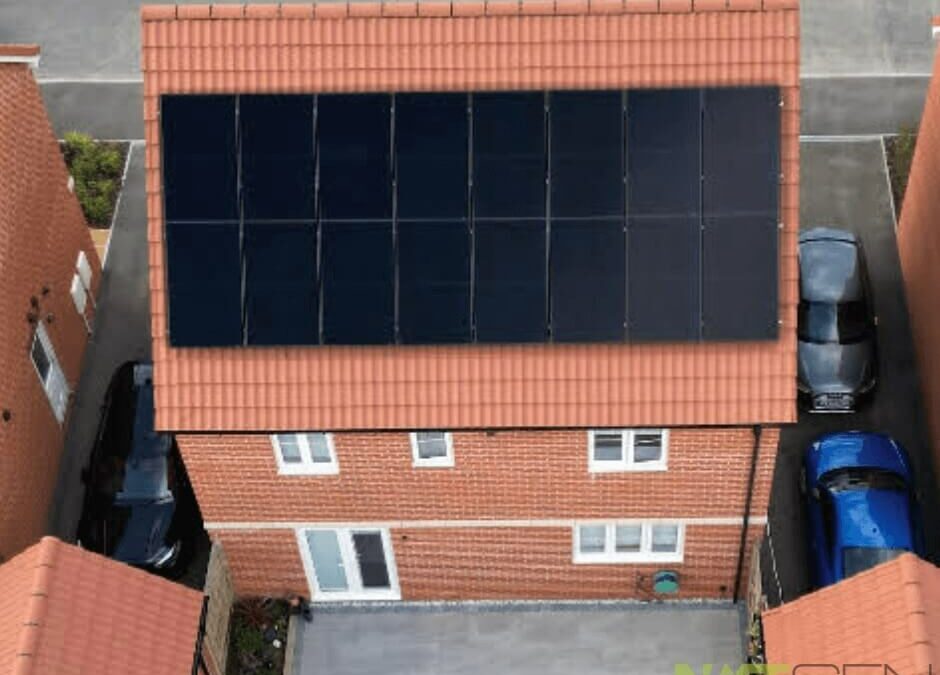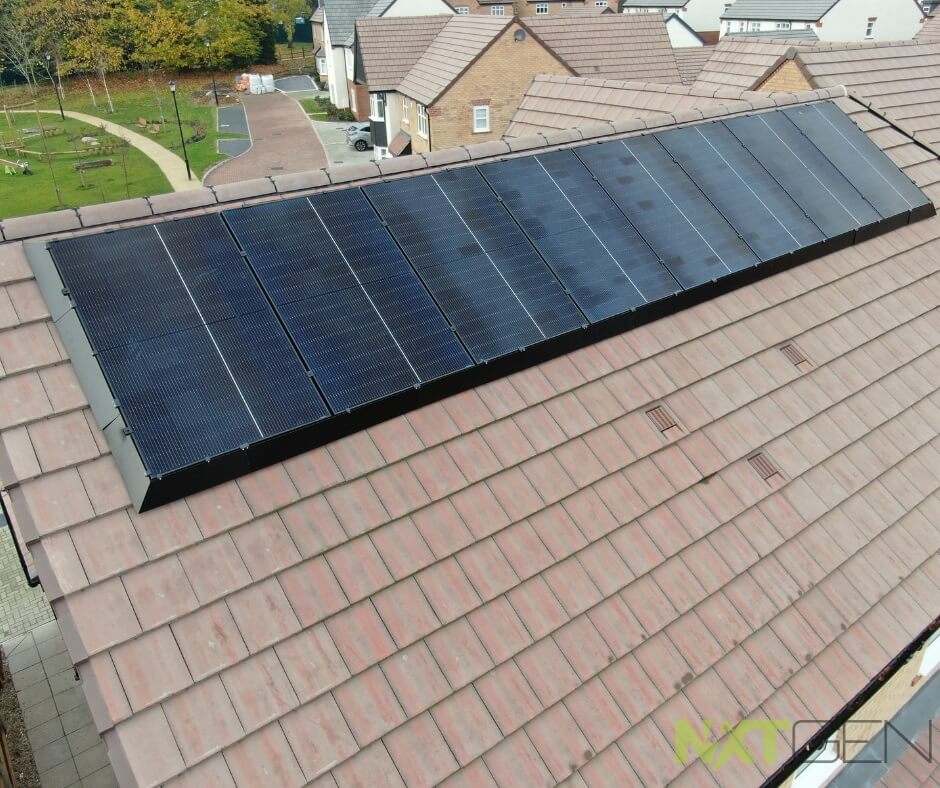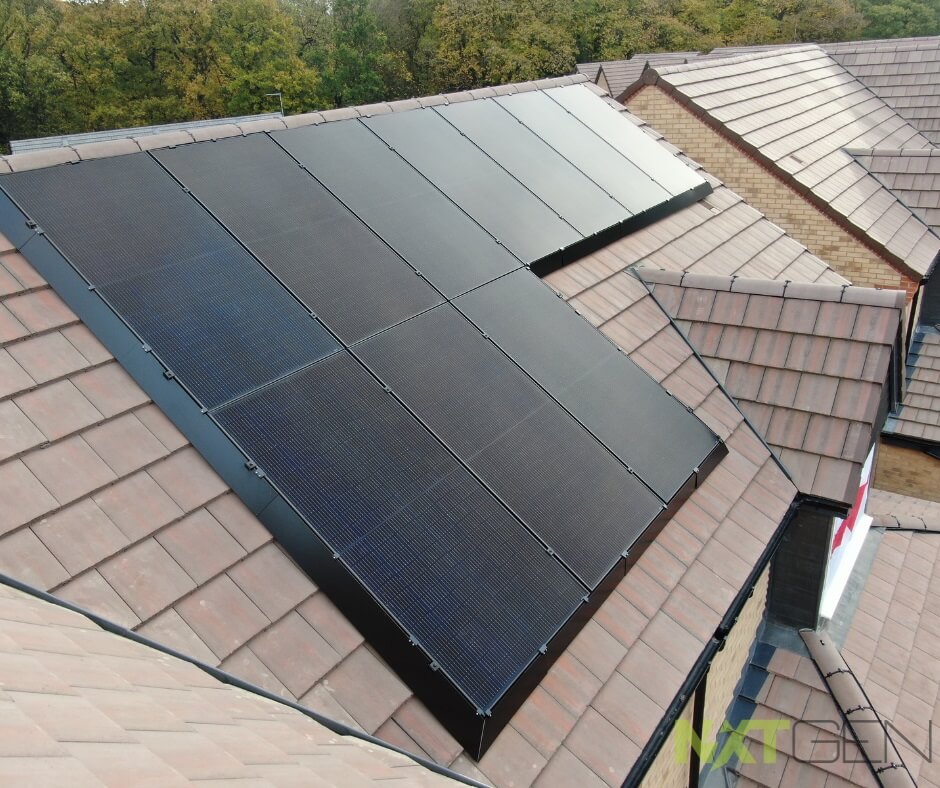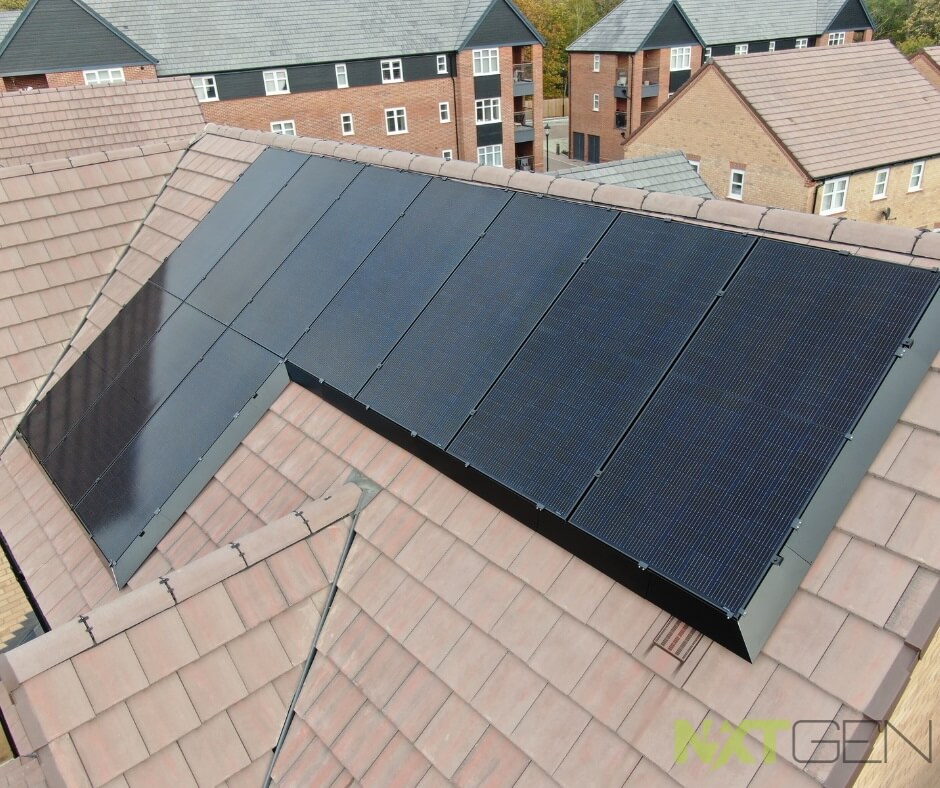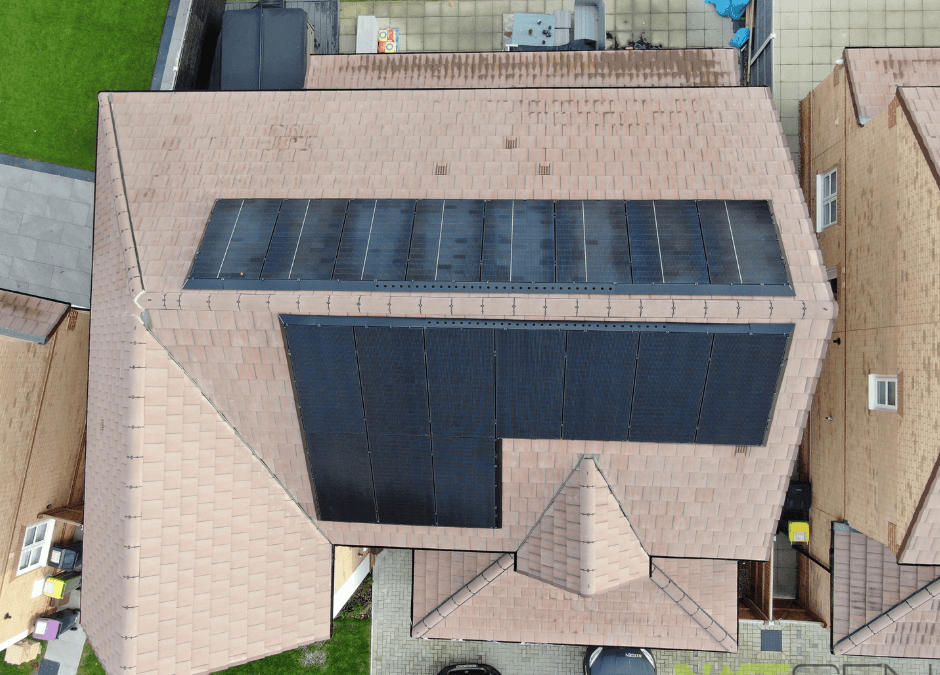


The average 3-bedroom home in the UK saves about £450 a year on energy bills with solar panels.
Solar panels could increase your home’s value by up to 14% according to the BOXT Energy Report.
When selling your home you should reassure potential buyers that maintenance on them is minimal.
If you’re ever sold a house in the UK you know how lengthy and complex the whole property selling process is. You will know therefore that there are several factors that can influence the value of your home, including the number of bedrooms, the need for urgent renovations, and, given today’s high energy costs, its energy efficiency rating (EPC Rating).
Solar panels can significantly increase your home’s value due to the potential energy bill savings for buyers according to the BOXT Energy Report. For instance, a typical 3-bedroom home could see annual energy bill savings of around £450 with solar panels. Additionally, solar panels attract eco-conscious buyers seeking to reduce their carbon footprint.
This blog post explores everything you need to know about selling a home with solar panels in the UK. You’ll learn about how solar panels can increase your home’s value, effectively promote your home to potential buyers, and understand whether you can take your solar panels with you when you move.

Do solar panels increase the value of your home?
The answer to this question is a resounding yes. Numerous studies, like the BOXT Energy Report, have consistently shown that solar panels add value to homes in the UK, though the exact amount can vary based on various factors including location.
A recent study conducted by home improvement experts BOXT revealed that solar panels can boost your home’s value by up to 14%. While this figure was slightly lower in southwest England, it was higher in the Midlands, according to the report.
Furthermore, a survey by The Eco Experts in 2023 found that a significant 69% of Britons would be more likely to buy or rent a property equipped with solar panels.
Solar panels can also enhance your home’s Energy Performance Certificate (EPC) Rating, making it more attractive to property buyers. This means that potential new owners will have less work to do to reduce their energy bills long-term, a factor your estate agent should be emphasizing during home viewings and negotiations.

Is it easier to sell my house if it has solar panels?
While the percentage of UK residents seeking homes with pre-installed solar panels has decreased slightly from 2023 (69%), there’s still a strong interest, with 65% still interested in such properties .
Interestingly, there’s a growing preference among people to install new solar panel systems rather than buying homes with fully owned solar panels. Additionally, the likelihood of current home buyers purchasing solar panels within the next year has increased from 10% to 12%.
Overall, it’s still advantageous to sell a house with solar panels, as only about 4% of home buyers are highly unlikely to consider buying a property with rooftop solar panels.

How do I promote my solar panels to potential buyers?
Promoting solar panels is similar to highlighting any other standout feature of your home, such as a new kitchen, a new bathroom, double-glazed windows, or a new roof. You should ensure that your estate agent takes clear pictures of your rooftop solar panels, inverter, and any solar batteries, if you have them installed.
Any photos that you or your installer took during the solar panel installation, perhaps from scaffolding or from a drone, can be particularly effective in selling your home with solar panels. These images and video footage can capture the solar panels in their pristine condition and can be included in your property listing on websites like Rightmove, On The Market and Zoopla.
It’s crucial to provide your estate agent with detailed information about your solar panels, enabling them to answer any questions from potential buyers. This includes the installation date, warranty coverage, and the benefits you’ve experienced, such as energy bill savings and earnings from the Smart Export Guarantee (SEG) Scheme.
These guidelines apply whether you’re selling privately or through an estate agent. Reassure potential buyers that solar panel maintenance is minimal and can extend their lifespan beyond the typical 25-30 years with proper care.
After the property sale, provide the new owners with all relevant installation information, contact details, and maintenance instructions to ensure they fully benefit from their solar investment, and preferably give them the ‘Handover Pack’ from the MCS Certified installer, that contains all the solar panel system documentation.
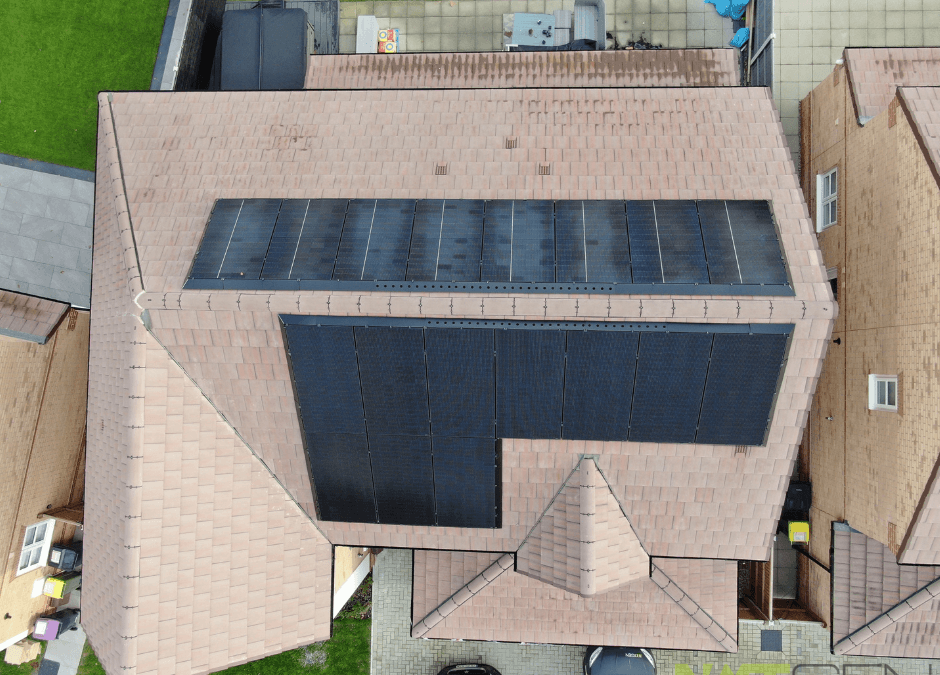
Can I take my solar panels when I move house?
Technically, yes, you can remove your solar panels and relocate them to your new home. However, it’s generally not recommended due to the very high costs involved and the potential risk of voiding your warranty, especially if you use a different installer than the original one.
If relocating your solar panels is essential to you, your first step should be to contact your original installer. This can be challenging if the company is no longer operational, as you’ll need to decide whether the potential warranty void is worth all the effort.
Additionally, installing professional scaffolding to remove and reinstall the solar panels can deter potential buyers of your old home. The panels may also be outdated compared to newer solar panel technology (which is changing ever year), making it worth considering whether the effort and very high cost are justified, especially as solar panel efficiency continues to improve.
Furthermore, if you’re currently benefiting from the expired Feed-In Tariff (FiT), removing your solar panels will likely terminate this financial incentive.
When making your decision, it’s helpful to think of your solar panels like a boiler or heat pump. For a free quote on solar panel installation in your new home, simply Contact Us, and we will give you a free no-obligation quote, tailored to your unique energy requirements.
Other Things to Consider
In addition to the points discussed above, here are some further factors to consider:
- Age of Your Solar Panels: If your solar panels are nearing the end of their lifespan, this could deter potential buyers. Most warranties last for 25 years, so be transparent about the panel’s age. You may also want to explore recycling options for your solar panels.
- Local Solar Installation Prices: While solar panel prices have decreased significantly, installation remains a substantial investment, with the average UK installation cost around £9,000 in 2024. While UK government grants and funding schemes exist, many prospective buyers are attracted to the idea of avoiding upfront costs and directly benefiting from energy bill savings, the Smart Export Guarantee (SEG) Scheme, and reduced carbon footprint.
- Location and Direction: The location and orientation of your solar panels are crucial. While direct sunlight isn’t always necessary, it improves efficiency. Ensure that any nearby trees don’t obstruct your panels, as this may require remediation before selling your property.
- Smart Export Guarantee (SEG): If you currently receive payments through the Smart Export Guarantee (SEG) Scheme, these will cease upon moving, potentially impacting your finances if you rely on them.
- Aesthetic Preferences: Not everyone appreciates the appearance of solar panels. If this is the case with a potential buyer, there may be limited options to address their preference. Be prepared for this to be a deal-breaker for some. However, for others, solar panels can be seen as an attractive, future-proof, and a cost-saving feature.
Should I get solar panels before selling my property?
While solar panels can enhance your home’s value and attract potential buyers, it’s essential to carefully consider whether it’s the right decision if you plan to move soon. Adding a solar panel installation to the selling process can increase stress.
Solar panels are a long-term investment, offering up to 25 years of reduced electricity bills. Depending on the installation size and whether you included a solar battery, you can expect to break even on your investment within about 10-15 years. Given this timeframe, it’s unlikely that you’ll recoup your solar panel investment if you plan to move in the near future.
Our professional recommendation is to weigh the pros and cons of installing solar panels before selling your home to determine if it’s the right course of action. You might find it more beneficial to save your money and invest in solar panels for your future home instead.
Summary
Highlight your solar panels as you would other desirable features of your home. Take photos and ensure they are included in your property listings.
After the sale, provide the new owners with all relevant installation details, contact information, and maintenance instructions and preferably the ‘Handover Pack’ from the MCS Certified Installer.
Consider solar panels as you would a boiler or heat pump when making decisions about your home.
Solar panels can enhance your home’s value and attract potential buyers.
Are you considering getting Solar Panels?
If you are a Essex homeowner considering installing solar panels in Essex, get in touch with us today! The solar energy experts here at NXTGEN Energy will be more than happy to help you on your Solar journey. Call us on 01268 928 690 or simply click ‘Learn More’ below to fill out our short form, to get connected to a Solar Energy Expert.
FAQ: How to Sell a House with Solar Panels
Additional Tips
Highlight the environmental benefits: Emphasize the positive impact of solar panels on reducing carbon emissions and promoting sustainability.
Provide clear documentation: Ensure the new owners have all necessary information about the solar system, including installation details, warranties, and maintenance guidelines.
Address potential concerns: Be prepared to answer questions about solar panels’ appearance, potential noise, and any other concerns buyers might have.
You might also be interested in…
- Solar Panels: Pros, Cons, and Whether They’re Worth ItSolar panels can cut your energy bills by up to 70%, and surplus electricity can be sold back to the National Grid through the Smart Export Guarantee (SEG) Scheme. They reduce your carbon footprint, require minimal maintenance, and can last over 30 years, making them a long-term eco-friendly investment. Upfront costs are… Read more: Solar Panels: Pros, Cons, and Whether They’re Worth It
- 8 Facts About Solar Energy That May Surprise YouAbundant Energy: The Earth gets enough sunlight yearly to power us for 20,000 years. It’s renewable & clean. Innovative History: Solar energy’s roots include discoveries by scientists like Becquerel & Einstein. Economic & Green Impact: Solar is cheaper than fossil fuels, lowers emissions & creates thousands of jobs. UK Solar Growth:… Read more: 8 Facts About Solar Energy That May Surprise You
- Understanding Solar Panel EfficiencySolar panels convert sunlight to electricity through photovoltaic cells, storing extra energy for later use. There are three main types of solar panels: monocrystalline, polycrystalline, and thin-film. Monocrystalline panels lead in efficiency (20%+), but new technologies are improving performance continuously. Solar panels save money, boost property value & reduce environmental impact,… Read more: Understanding Solar Panel Efficiency
- Are Brits Turning Their Backs on Solar Panels?High upfront costs: Deter many Brits from installing solar panels despite falling prices & financing options. Myths debunked: Solar panels work in cloudy weather, need minimal maintenance & can last 25–30 years. Financial & Environmental benefits: Solar panels cut electricity bills by up to 70% & lower carbon footprints. Government support… Read more: Are Brits Turning Their Backs on Solar Panels?
- Are solar panels worth it? NXTGEN Energy’s guide to getting startedInstalling solar panels can significantly reduce electricity bills, with prices dropping in recent years. Solar panels are a good investment for those with the space, daytime electricity usage & a south-facing roof. Consider financing options carefully, as borrowing can be expensive; paying outright provides better returns. Solar batteries store energy for… Read more: Are solar panels worth it? NXTGEN Energy’s guide to getting started
- The History of Solar EnergyAncient Use: Early civilizations used the sun for heating and cooking. Early Innovations: Key 16th-17th century discoveries laid the groundwork for solar technology. 20th Century Breakthroughs: Notable advancements included practical photovoltaic cells & solar in space. Modern Expansion: Solar energy has become efficient and widespread in the 21st century. The history… Read more: The History of Solar Energy
- How Solar Panels Increase Property ValueSolar panels can boost your home’s value by an average of £2,000 & command a price premium of 0.9% to 2%. Homes with solar panels have better EPC ratings, which can increase property value by up to 14%. Eco-friendly homes are in high demand, making solar-powered homes more attractive to buyers. … Read more: How Solar Panels Increase Property Value
- Did You Know That Solar Costs Have Fallen by 82%?Solar panel costs have dropped by 82% since 2010, making solar energy more accessible for UK homeowners. Factors to consider before switching to solar include initial investment, energy savings, and roof suitability. Government incentives, such as the Smart Export Guarantee (SEG) scheme, can help offset the initial costs. NxtGen Energy offers… Read more: Did You Know That Solar Costs Have Fallen by 82%?
- Advantages of Solar Energy in 2025Reduces carbon emissions & improves air quality by producing clean, renewable energy. Lowers electricity bills and provides long-term financial benefits for homeowners & businesses. UK government incentives, like the Smart Export Guarantee, make solar adoption more attractive. Expands workforce opportunities & boosts local economies through investments in the solar energy sector.… Read more: Advantages of Solar Energy in 2025
- Solar Panels in Essex. Are they worth it? [2025]Solar panels can save Essex homeowners £300-£500 annually on electricity bills due to decent sunshine hours. The Smart Export Guarantee (SEG) tariff offers additional income for excess electricity exported to the Grid. Initial installation costs range from £4,500 to £8,500, but government grants can help reduce this expense. . Free no-obligation… Read more: Solar Panels in Essex. Are they worth it? [2025]
- What are the best SEG tariffs? [February 2025]Best SEG tariffs at a glance The best SEG tariff in February 2025 is Solar Savings Exclusive from Good Energy. Energy companies offer the best SEG tariffs to their own customers in February 2025. The highest SEG tariff pays 40p per kWh – if you meet the qualifying conditions. The best… Read more: What are the best SEG tariffs? [February 2025]
- Why Manufacturing & Logistics Businesses need to invest in Warehouse Solar Panels [2025]Commercial Solar Panels can reduce energy bills & enhance financial output for manufacturing & logistics businesses. Large, flat, metal warehouse roofs are ideal for installing commercial solar panels, which can maximize solar exposure. Although solar panels require initial investment & maintenance, they reduce energy costs & generate additional revenue. Installing solar… Read more: Why Manufacturing & Logistics Businesses need to invest in Warehouse Solar Panels [2025]


 How to Sell a House With Solar P...
How to Sell a House With Solar P...


